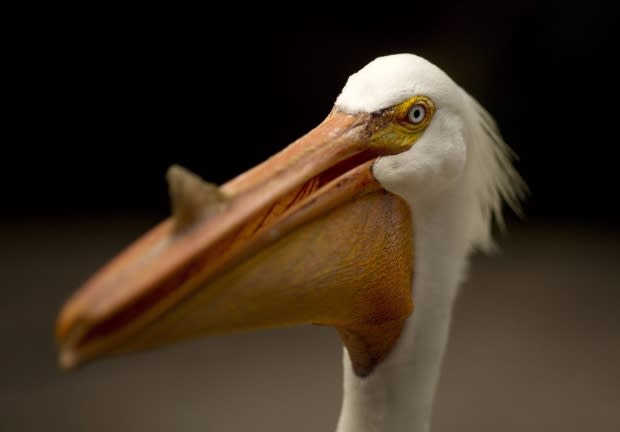Pod of pelicans establishes 'freewheeling' colony on Edmonton ponds
Edmonton is known as the magpie capital of Canada but a bird of a different feather is flocking to the city.
A pod of pelicans has made their homes on the stormwater ponds in Beaumaris and Greisbach neighbourhoods.
Local bird watchers are all aflutter over the big-beaked birds, which return to the area each spring.
"It's really the brown pelican that's associated with the ocean so it's perfectly natural to have these big white ones in our neighbourhoods," said Gordon Court, a provincial wildlife specialist with the Alberta government.
"It's a species that's been known to be here since our earliest explorers arrived here in Alberta."
When it comes to the city's bird populations, the American white pelican is not a common sight but has been a fixture in south Edmonton since at least 2016.
Announcing their arrival with strange tuba-like squawks, they can often be seen diving for meals, scooping their pouches into the water like fishing nets.
The pelicans in Edmonton are likely younger birds that aren't tied down with the obligations of breeding and rearing young, Court said.
Mature birds spend their summers breeding in colonies on larger lakes. But the young birds can go further afield.
"They're not feeding young so they're able to freewheel and go anywhere they want to feed on fish," Court said in an interview with CBC Radio's Edmonton AM.
"The breeding birds have really bright orange beaks and they have a little horn on the beak. The birds that are not breeding, they have a little patch of grey feathers on the back of their head."
'A nice lifestyle'
The presence of pelicans in the city is a good sign for the species, Court said.
While it is no longer considered endangered, the American white pelican spent years on the protected species list.
The birds, like many other species, suffered from egg thinning caused by pesticide pollution.The shells became so fragile they could no longer support incubating eggs, Court said.
"They declined throughout the 1950s, 1960s and early 1970s but since the global levels of DDT have declined over the years, we've seen a tremendous recovery.
"And we're seeing more and more of them in Edmonton and across the province."
Among the world's largest birds, the pelicans will remain in Alberta until the weather turns, Court said.
"They'll be here until freeze up and then they'll head south. Most of our birds winter over in the Gulf of Mexico or southern California.
"They have a nice lifestyle."


